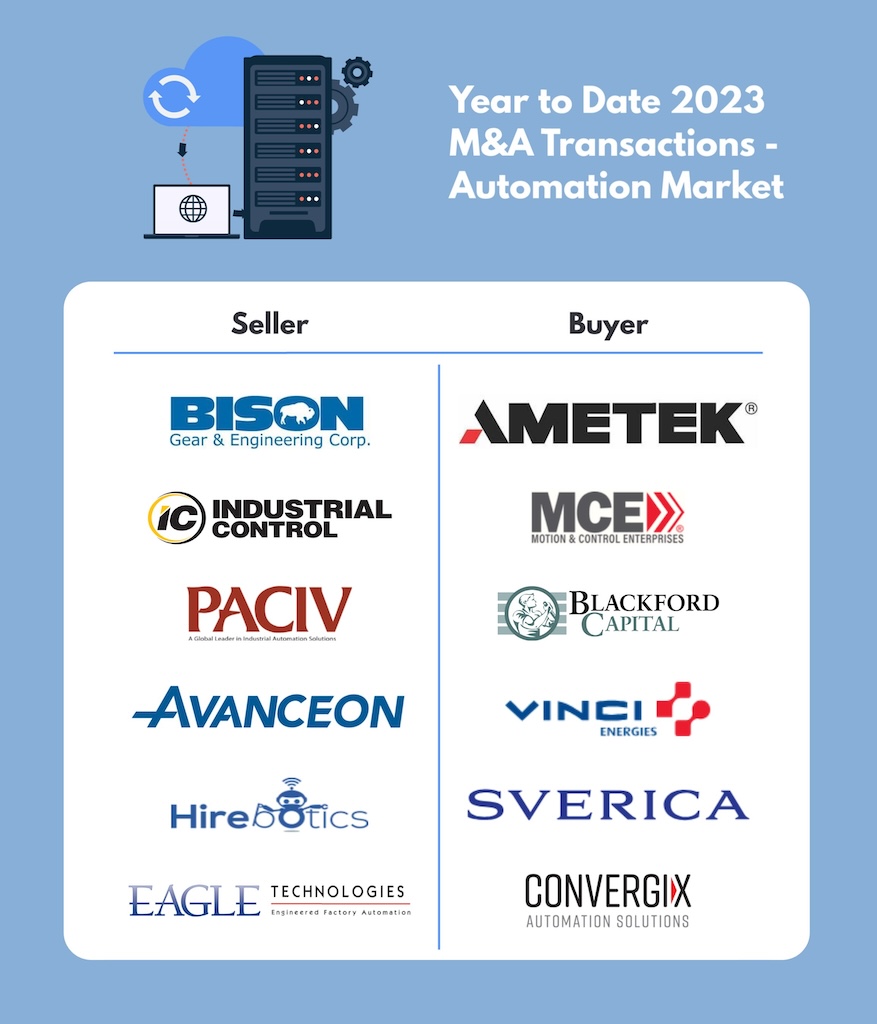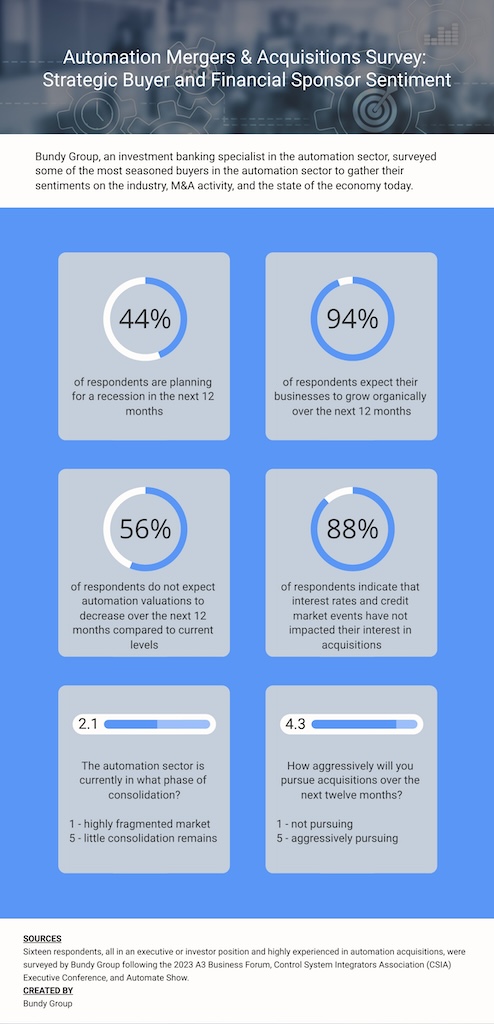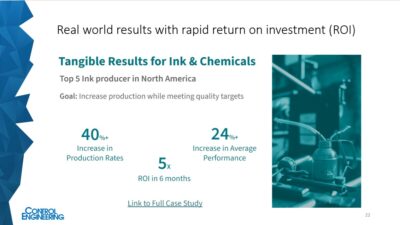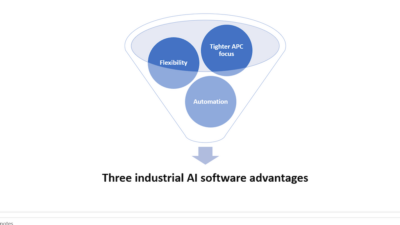Through a combination of transaction experience, meetings at industry events, and a recently completed survey, Bundy Group provides an update on the mergers and acquisitions market for the automation sector.

Bundy Group is an investment bank and advisory firm specializing in the automation market, which includes such sub-markets as control system integration, warehouse automation and industrial technology.
The automation industry continues to attract investor (i.e., financial sponsor or private equity) interest, which is resulting in a tremendous amount of consolidation. Bundy Group is currently representing and advising numerous automation companies in business sales and capital raises, which greatly informs our view on market activity. In addition, at the recent A3 Business Forum, Control System Integrators Association (CSIA) Executive Conference and Automate events, I held numerous meetings with executives, financial sponsor professionals and corporate development directors to better understand buyer and investor sentiment for the automation sector today. Finally, Bundy Group conducted a survey of the most active buyers and financial sponsors in the segment.
The survey responses, coupled with the tremendous interest Bundy Group has witnessed in our business sale engagements, affirms our view that the automation M&A and capital market is incredibly strong and active. We have offered below a couple of automation market observations. Furthermore, the results of the recent Bundy Group survey are captured below along with our analysis.
Macroeconomic effects in the M&A community
One of the key topics today in the M&A community is the current macroeconomic environment, including continued concerns about a recession and how it might impact the automation market today.
Owners and seasoned buyers are watchful of the potential negative impact on companies due to the recent credit market challenges and the consequences from the Silicon Valley Bank and First Republic Bank failures.
One executive stated rising interest rates and tightening lending restrictions will “make us more selective in what companies we buy, as we can’t have foot faults in these conditions.”
This executive also said, “Our main lender is still supportive of our acquisition focus and growth efforts and will provide funding, but it has tightened our credit line from $50 million to $25 million over the past few months.”
War for talent
Automation organizations continue to face difficulties in finding talented engineers and other technical talent. Alex Chausovsky, an analytics and market research expert with a specialization in the automation sector, said, “While the overall unemployment rate was 3.7% in May, up slightly from the 50-year low of 3.4% in April, engineering roles had an unemployment rate of just 1.8%. This underscores the difficulty that many automation firms have in attracting, hiring and retaining top engineering talent. Even with a mild recession on the horizon, it’s critical for automation companies to continue to backfill roles and attract new talent to position themselves for the next macro rising trend, which will likely begin in the latter part of 2024.”

Three key survey findings
Bundy Group’s survey of 16 executives and financial sponsors with experience in automation industry acquisitions validated the insights heard at the automation conferences and added several new takeaways:
1. The economy and automation market. Despite continued concerns around a looming recession, the majority of survey respondents are not planning for a recession in the next 12 months. In addition, 15 of 16 executives expect their own businesses to grow in the next year. These respondents’ confidence helps validate the strength and resiliency of the automation market.
2. Merger and acquisitions. The respondents universally signaled continued and strong interest in acquisitions, indicating the automation market still has plenty of runway left for consolidation. Most respondents said the industry is still in the early innings of consolidation and not even to its halfway mark. Furthermore, on a 1 to 5 scale (1 = not looking for acquisitions; 5 = aggressively looking for acquisitions), the average response was a 4.3, indicating M&A is alive and well with the brand name buyers in the automation industry. Furthermore, all but one of the respondents stated that current events in the financing markets have not decreased their appetite for acquisitions. As one executive said, “Rising interest rates have resulted in our taking a more conservative approach to acquisitions, as we are now placing an increased emphasis on quality, growing companies.”
3. Business valuations and deal structure. Business owners often ask Bundy Group about the current valuation multiples for businesses (i.e., are they increasing or decreasing?) 9 out of 16 strategic buyer and financial sponsor respondents revealed they do not expect automation valuations to decrease over the next 12 months compared to current levels. One executive with a strategic buyer said, “High quality assets will fetch historical valuations, but less attractive or higher risk transactions will see valuations reduced and less demand overall.”
Knowing what is in a company’s valuation
An equally important topic is what compromises a company’s valuation. Upfront cash from a buyer to a seller is an obvious component, but there is also creative structuring that can be utilized, which includes equity reinvestment by a seller (when a seller reinvests a portion of the transaction proceeds back into either the practice or a buyer’s stock), seller note (when the buyer and seller agree the buyer will pay the seller consideration in the form of a loan, i.e., principal and interest payments for an agreed upon period of time), or earn-out (the seller is paid consideration in the future when agreed-upon financial performance objectives are achieved).
Buyers can, and sometimes do, utilize creative structuring to minimize risk and ensure the seller has a vested interest in future success of the business. As one respondent stated, “We are asking for higher equity rollover from sellers today, such as 25-30% versus 15-25% in the past.”
From our transaction experience, Bundy Group has seen those equity rollovers yield a three times cash-on-cash return in the future… and sometimes much higher. Based on what we’ve learned from the automation conferences and the survey, a strong level of enthusiasm remains among owners and buyers.

The multi-billion-dollar automation market continues to thrive and evolve, and buyer and financial sponsor confidence is relatively strong in this uncertain macroeconomic environment. Judging by the robust performance of Bundy Group clients, coupled with the strong valuations we are receiving in our current client engagements, our team sees no momentum or value loss in the automation industry.
Bundy Group is a boutique investment bank that specializes in representing automation, industrial technology and cybersecurity organizations in business sales, capital raises and acquisitions. Over the past 33 years, Bundy Group has advised and closed on over 250 transactions. You can learn more at www.bundygroup.com or by contacting Clint Bundy at [email protected]. Bundy Group is a CFE Media and Technology content partner.



